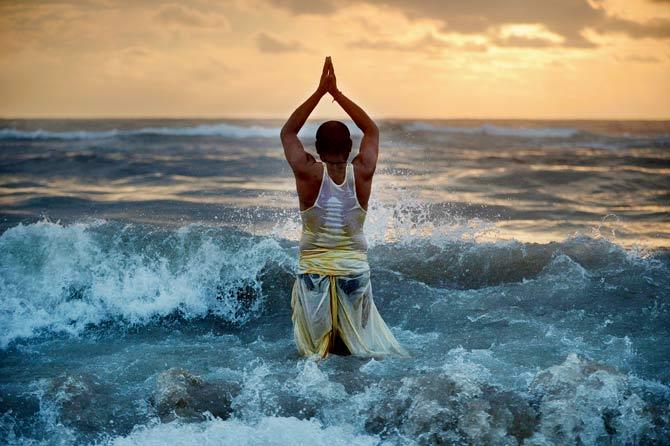Sun-day musings on the rigours of fasting for Chhath puja, and the life-giving, life-affirming ball of energy in our corner of the universe

 Last week, I was busy with Chhath puja, which forced me to ignore the world somewhat. It is a four-day festival that culminates on the sixth day after Diwali (thus the name) when devotees worship the rising sun. The person actually doing the puja undergoes gradually increasing periods of fasting; the third day and fourth morning are the toughest. Despite the fast's rigours, you need not necessarily seal yourself off from reality. Twitterverse (my favoured social media, along with Instagram) is readily available. Also, in theory, it's a good time for some reading and I have about 70 books piled in my bedroom and 400 on my iPad, waiting to be read. Also, there's TV and the streaming services if you just feel like vegetating.
Last week, I was busy with Chhath puja, which forced me to ignore the world somewhat. It is a four-day festival that culminates on the sixth day after Diwali (thus the name) when devotees worship the rising sun. The person actually doing the puja undergoes gradually increasing periods of fasting; the third day and fourth morning are the toughest. Despite the fast's rigours, you need not necessarily seal yourself off from reality. Twitterverse (my favoured social media, along with Instagram) is readily available. Also, in theory, it's a good time for some reading and I have about 70 books piled in my bedroom and 400 on my iPad, waiting to be read. Also, there's TV and the streaming services if you just feel like vegetating.

A devotee offers prayers to the sun god during Chhath Puja on Friday. Pic/AFP
ADVERTISEMENT
My third year running of Chhath puja found me totally without focus. Abstaining from non-vegetarian food — from the day after Diwali, not even onions or garlic — or from alcohol is meant to put you in the spiritual frame of mind. My pal Firdous says fasting is an inner cleansing of the individual. I found it to be a lowering of one's psychic temperature, a slowing down of the spiritual metabolism, to prepare you for prayer. Yes, I felt cleansed (and lighter) during the fast, but also a detachment from the world around.
Last year, for instance, I distinctly remember that on the third evening, after we prayed to the setting sun and were waiting around in my aunt's flat for everyone else to be fed, I sat and witnessed my relatives in action: They seemed to rush about in chaos and purposelessly. People rushing around not accomplishing much is a metaphor for life, but also cartoonish. True, not everyone can afford to detach themselves from reality; there are chores to be done. Some of my cousins, being Biharis, use the occasion of the gathering to start loud political arguments, which seemed sterile and also plain wrong. I didn't have the energy to blindly jump into any arguments but I can tell you the shouting seemed unnecessary, the words seemed illogically strung together, and the arguments plain dishonest.
This year produced deja vu, but of course, we all are a year older and wiser, and on the third evening, after praying to the setting sun, I simply sat in my aunt's flat and ignored the cacophony around me. (I knew that after the puja was over my spouse would anyway give me an update on the family politics.) I mused about the sun and I tried listening to the cassette playing in the living room of collected Chhath songs by a famous Bihari artiste. The songs sounded sweet, but rustic and kind of simplistic, in the way that many people I know are blind to the philosophical underpinnings of the strict rituals that they perform.
Diwali and Chhath puja came a bit early this year, in October, and so the days were still hot. As a result, the fast was a bit tough this time. On the final two days, for about 33 hours, not a drop of water entered my throat, and I felt parched. Instead of taking it easy, I had to visit the local market to do the documentation for a defamation case (a former editor's job is never done), and I returned home exhausted. That night, I couldn't get to sleep because I lay in bed fantasising about pouring myself a glass of crystal clear water. I fantasised about honey and pancakes and, for some reason, oranges. I tossed and turned, thinking about water and oranges.
On the final morning, after saying Chhath prayers and chanting the 108 names of the sun, my thoughts suddenly drifted to the Amar Chitra Katha I had read as a boy of the sun, his wife and her shadow. Then I heard in my mind the Beatles' Here Comes the Sun and Pink Floyd's Set the Control for the Heart of the Sun. Danny Boyle's film Sunshine came to mind. The rising red disc got more solid and crimson, and hanging in the sky I thought about the sun's physical properties — its sea of plasma, the bubbles of nuclear fusions, its distance of 15 crore kilometres, and its eventual collapse in five billion years to red dwarf.
I recalled the many awe-inspiring NASA photos on Instagram and the full glory of the life-giving, life-affirming, source of immense energy in our corner of the universe; the source of heat and light for us living, breathing beings with our existential torments. The sun is an immediate scale of how insignificant we are. Within the universe, the sun is insignificant — but even then, we are the universe's self-consciousness. No wonder we call the immensity that is there right above us, in front of our eyes, as God.
Aditya Sinha's crime novel, The CEO Who Lost His Head, is available now. He tweets @autumnshade. Send your feedback to mailbag@mid-day.com
 Subscribe today by clicking the link and stay updated with the latest news!" Click here!
Subscribe today by clicking the link and stay updated with the latest news!" Click here!







